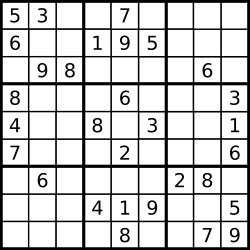LeetCode-in-Java
37. Sudoku Solver
Hard
Write a program to solve a Sudoku puzzle by filling the empty cells.
A sudoku solution must satisfy all of the following rules:
- Each of the digits
1-9must occur exactly once in each row. - Each of the digits
1-9must occur exactly once in each column. - Each of the digits
1-9must occur exactly once in each of the 93x3sub-boxes of the grid.
The '.' character indicates empty cells.
Example 1:

Input:
board = [ ["5","3",".",".","7",".",".",".","."],
["6",".",".","1","9","5",".",".","."],
[".","9","8",".",".",".",".","6","."],
["8",".",".",".","6",".",".",".","3"],
["4",".",".","8",".","3",".",".","1"],
["7",".",".",".","2",".",".",".","6"],
[".","6",".",".",".",".","2","8","."],
[".",".",".","4","1","9",".",".","5"],
[".",".",".",".","8",".",".","7","9"]]
Output:
[["5","3","4","6","7","8","9","1","2"],
["6","7","2","1","9","5","3","4","8"],
["1","9","8","3","4","2","5","6","7"],
["8","5","9","7","6","1","4","2","3"],
["4","2","6","8","5","3","7","9","1"],
["7","1","3","9","2","4","8","5","6"],
["9","6","1","5","3","7","2","8","4"],
["2","8","7","4","1","9","6","3","5"],
["3","4","5","2","8","6","1","7","9"]]
Explanation: The input board is shown above and the only valid solution is shown below:

Constraints:
board.length == 9board[i].length == 9board[i][j]is a digit or'.'.- It is guaranteed that the input board has only one solution.
Solution
import java.util.ArrayList;
import java.util.List;
public class Solution {
private List<int[]> emptyCells = new ArrayList<>();
private int[] rows = new int[9];
private int[] cols = new int[9];
private int[] boxes = new int[9];
public void solveSudoku(char[][] board) {
for (int r = 0; r < 9; r++) {
for (int c = 0; c < 9; c++) {
if (board[r][c] == '.') {
emptyCells.add(new int[] {r, c});
} else {
int val = board[r][c] - '0';
int boxPos = r / 3 * 3 + c / 3;
rows[r] |= 1 << val;
cols[c] |= 1 << val;
boxes[boxPos] |= 1 << val;
}
}
}
backtracking(board, 0);
}
private boolean backtracking(char[][] board, int i) {
// Check if we filled all empty cells?
if (i == emptyCells.size()) {
return true;
}
int r = emptyCells.get(i)[0];
int c = emptyCells.get(i)[1];
int boxPos = (r / 3) * 3 + c / 3;
for (int val = 1; val <= 9; ++val) {
// skip if that value is existed!
if (hasBit(rows[r], val) || hasBit(cols[c], val) || hasBit(boxes[boxPos], val)) {
continue;
}
board[r][c] = (char) ('0' + val);
// backup old values
int oldRow = rows[r];
int oldCol = cols[c];
int oldBox = boxes[boxPos];
rows[r] |= 1 << val;
cols[c] |= 1 << val;
boxes[boxPos] |= 1 << val;
if (backtracking(board, i + 1)) {
return true;
}
rows[r] = oldRow;
cols[c] = oldCol;
boxes[boxPos] = oldBox;
}
return false;
}
private boolean hasBit(int x, int k) {
return (x >> k & 1) == 1;
}
}

